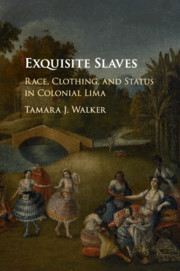Description
Exquisite Slaves
Race, Clothing, and Status in Colonial Lima
Author: Walker Tamara J.
This book examines the relationship between clothing and status in the urban slaveholding society of Lima, Peru.
Language: English
Subject for Exquisite Slaves:
Exquisite Slaves
Publication date: 04-2019
Support: Print on demand
Publication date: 04-2019
Support: Print on demand
Exquisite Slaves
Publication date: 07-2017
240 p. · 16x23.5 cm · Hardback
Publication date: 07-2017
240 p. · 16x23.5 cm · Hardback
Description
/li>Contents
/li>Biography
/li>
In Exquisite Slaves, Tamara J. Walker examines how slaves used elegant clothing as a language for expressing attitudes about gender and status in the wealthy urban center of eighteenth- and nineteenth-century Lima, Peru. Drawing on traditional historical research methods, visual studies, feminist theory, and material culture scholarship, Walker argues that clothing was an emblem of not only the reach but also the limits of slaveholders' power and racial domination. Even as it acknowledges the significant limits imposed on slaves' access to elegant clothing, Exquisite Slaves also showcases the insistence and ingenuity with which slaves dressed to convey their own sense of humanity and dignity. Building on other scholars' work on slaves' agency and subjectivity in examining how they made use of myriad legal discourses and forums, Exquisite Slaves argues for the importance of understanding the body itself as a site of claims-making.
Introduction; 1. Slavery and the aesthetic of mastery; 2. Legal status, gender, and self-fashioning; 3. Black bodies and boundary trouble; 4. Painting, print culture, and colonial ideation; 5. Ladies, gentlemen, slaves, and citizens; Epilogue.
Tamara J. Walker earned her Ph.D. in History from the University of Michigan. Her previous work has appeared in Slavery and Abolition, Safundi, Gender and History, and the Journal of Family History.
© 2024 LAVOISIER S.A.S.




